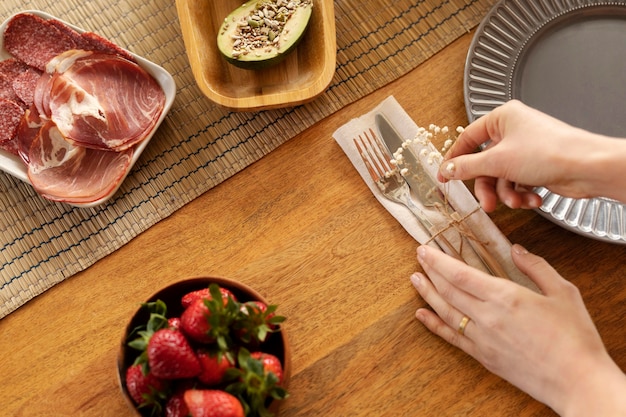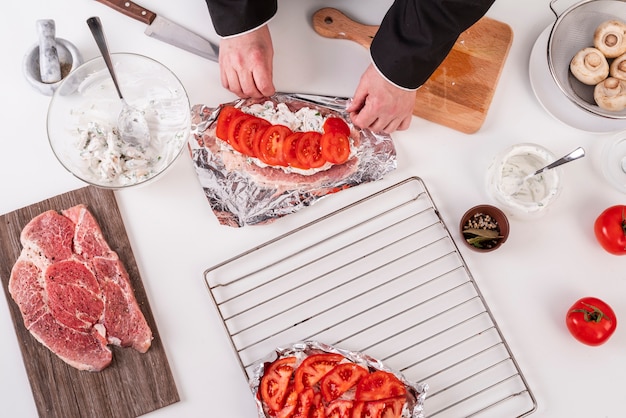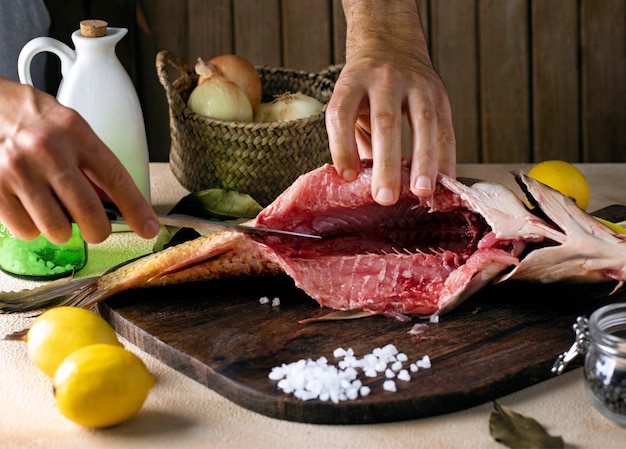Ah, steak. A culinary classic, a crowd-pleaser, and a dish I've been absolutely obsessed with since I was a kid. Those Friday night steak dinners with my family, my dad manning the grill like a maestro, crafting sizzling, juicy masterpieces that left us all fighting for the last piece – those are memories etched in my mind. Coupled with years of experimentation, countless triumphs (and some rather disastrous steak-related mishaps, I'll admit), I've finally arrived at the point where I can confidently say: this is the ultimate guide to cooking the perfect steak, every single time.
This isn't just some dry, academic guide. It's my personal journey, my tips and tricks, my victories and, yes, even my mishaps. Think of it as a conversation over a glass of red wine, sharing steak secrets with a friend. So, pour yourself a drink, settle in, and let's get this sizzling!
(Part 1) choosing the right cut

Knowing Your Cuts: From Classic to Adventurous
choosing the right cut of steak is the first step towards perfection. It's not about snobbery, it's about understanding how different cuts behave when cooked. Let's explore some of the most popular options:
- The Classics: Rib-eye, sirloin, and T-bone are the stalwarts for a reason. These cuts are beautifully marbled with fat, which translates to incredible juiciness and tenderness. The rib-eye boasts a rich, buttery flavor thanks to its marbling and the fact that it comes from the rib area, which is often considered the most flavorful part of the cow. The sirloin is a leaner option with a more robust flavor, while the T-bone, with its bone-in structure, offers both a leaner sirloin side and a fattier tenderloin side. This combination makes it a favorite for those who want both options on their plate.
- For the Adventurous: flank steak is a leaner option, perfect for grilling or stir-frying. Its long, thin shape is ideal for slicing against the grain to tenderize it. skirt steak, another excellent grilling choice, is known for its robust flavor and its characteristic “skirt” shape. It’s a bit tougher than other cuts, but the flavor is worth the effort.
- The Ultimate Splurge: filet mignon, with its buttery tenderness and rich flavor, is truly a special occasion cut. It's incredibly delicate, practically melting in your mouth, but it comes with a heftier price tag.
How to Choose a Steak: What to Look For
Armed with your knowledge of cuts, head to the butcher counter! Don't be afraid to ask questions, and keep these tips in mind:
- Marbling: This is the key to juiciness and flavor. The more white streaks of fat you see running through the muscle, the more flavorful and tender the steak will be. Think of marbling as the steak's internal “flavor bomb.”
- Color: A deep, rich red color is a sign of freshness. Avoid steaks that have a dull, grayish hue.
- Texture: A firm, springy feel indicates that the steak is fresh and hasn't been frozen. It should bounce back when you press it gently.
(Part 2) Preparing Your Steak: Getting Ready to Sizzle

Bringing it to Room Temperature: A Crucial Step
Now that you've got the perfect steak, it's time to get it ready for the pan (or grill!). One common mistake is cooking your steak straight from the fridge. This temperature shock can lead to uneven cooking and a tough, chewy texture. The solution? Bring your steak to room temperature for about 30 minutes before cooking. This gradual warming allows the meat to cook evenly and achieve that gorgeous, juicy result.
Seasoning with Finesse: Salt and Pepper are Kings
Simple is best when it comes to seasoning. Salt and pepper are all you really need, and trust me, they can make a world of difference. Season generously, about 30 minutes before cooking, to allow the salt to penetrate the meat and enhance its flavour. The salt draws out moisture, creating a more flavorful, tender steak.
Experimenting with Marinades: A Flavour Boost
While salt and pepper are the essential duo, don't be afraid to experiment with marinades! They can add an extra layer of flavor and help keep the steak moist. My go-to marinade is a blend of soy sauce, olive oil, garlic, and a touch of honey. The soy sauce adds a savory depth, the olive oil helps to tenderize the meat, the garlic provides a pungent kick, and the honey adds a touch of sweetness that complements the savory flavors. It's a truly delicious combination!
(Part 3) cooking techniques: Mastering the Heat

Searing for That Perfect Crust: A Culinary Kiss of Fire
Searing is the key to achieving that irresistible, crispy crust that adds both visual appeal and flavor. It's a technique that uses high heat to create a beautiful caramelized exterior. Here's the trick: use a heavy cast-iron pan or a grill pan over high heat. The pan should be smoking hot when you add your steak. This intense heat will instantly sear the surface, locking in the juices and creating that coveted golden brown crust.
Cooking the Steak to Your Preference: Doneness Decoded
This is where it gets personal. The desired level of doneness is a matter of taste, but here's a general guide to help you navigate the spectrum:
- Rare: The center is cool and red, with a slight pink edge. It's almost like a warm, soft center. This level of doneness is for those who enjoy a truly raw center.
- Medium-rare: The center is warm and pink, with a wider pink edge. The center should feel slightly cool to the touch, but not cold. This is a classic choice for many steak enthusiasts.
- Medium: The center is warm and pink, with a small pink edge. The center should feel slightly warm to the touch. This level of doneness offers a balanced combination of tenderness and a slight hint of pinkness.
- Medium-well: The center is warm and has a faint pink hue. The center should feel comfortably warm to the touch. This option is perfect for those who prefer less pink in their steak.
- Well-done: The center is warm and completely brown. This is the most cooked level of doneness, with no pinkness remaining. While some people prefer this level, it can result in a drier steak.
Tips for Even Cooking: Avoiding Pitfalls
Don't overcrowd the pan: If you're cooking multiple steaks, cook them in batches to ensure even heat distribution. Crowding the pan will lower the temperature, leading to uneven cooking.
Use a meat thermometer: It's the most accurate way to ensure your steak is cooked to your liking. Insert the thermometer into the thickest part of the steak, making sure it doesn't touch bone.
Flip the steak only once: This prevents moisture loss and ensures even cooking. Turning the steak too frequently can make it tough and dry.
(Part 4) Resting for Juiciness: A Crucial Step in Steak Alchemy
Resist the urge to cut into your steak immediately after cooking! It needs to rest for at least 5-10 minutes to redistribute the juices. Think of it as a moment of relaxation for the steak. Covering the steak loosely with foil will keep it warm while it rests. During this time, the juices, which were pushed to the surface during cooking, will re-absorb back into the meat. This resting period results in a more tender, juicy steak.
(Part 5) Serving the Perfect Steak: A Symphony of Flavors
The side dish Dilemma: Finding the Perfect Harmony
The perfect steak deserves a worthy side dish. Here are some classic pairings and some more creative options to tantalize your taste buds:
- Classic: Roasted vegetables, creamy mashed potatoes, or a simple green salad. These classic sides complement the rich flavor of steak without overpowering it.
- Hearty: Mushroom sauce, Béarnaise sauce, or a rich gravy. These sauces add a luxurious touch and enhance the savory notes of the steak.
- Creative: Grilled pineapple, roasted sweet potatoes, or a vibrant chimichurri sauce. These options provide a refreshing counterpoint to the richness of the steak, adding a burst of flavor and texture.
The Art of Presentation: A Culinary Masterpiece
Presentation matters, even for a simple steak. Place your steak on a warm plate, slice it beautifully against the grain to enhance tenderness, and drizzle it with your chosen sauce. A sprinkle of fresh herbs adds a touch of elegance.
(Part 6) My Steak-Cooking Journey: From Mishaps to Mastery
Early Mishaps and Lessons Learned: The Trials of a Steak Novice
Remember those early attempts at steak? I've burned them, overcooked them, and even managed to turn them into something resembling charcoal. I've definitely had my fair share of steak-related disasters. But every mistake was a lesson. I learned to respect the power of high heat, the importance of resting the meat, and the value of a good meat thermometer.
The Triumph of the Perfect Steak: A Moment of Culinary Joy
There's nothing quite like the satisfaction of nailing a perfect steak. It's that combination of a juicy, tender interior and a crispy, flavorful crust. The moment you cut into it and the juices run out – pure magic! The culmination of all those lessons and experiments.
My Favourite steak recipes: Sharing the Love
Over the years, I've developed a few signature steak recipes that I'm always happy to share. Each one offers a unique flavor profile, catering to different taste preferences:
- Garlic Herb Steak: A simple but incredibly flavorful recipe that uses fresh garlic, thyme, and rosemary. It's a versatile dish that can be enjoyed for a weeknight dinner or a casual gathering. The combination of aromatic herbs and garlic infuses the steak with a rich, savory flavor that's truly irresistible.
- Peppercorn Crusted Steak: A luxurious and elegant option with a satisfyingly spicy bite. The black peppercorns create a beautiful crust that adds a touch of sophistication to any meal. This recipe is perfect for a special occasion or when you want to impress your guests. The peppercorns add a bold, spicy flavor that complements the rich taste of the steak.
- Steak with Mushroom Sauce: A classic combination that's both comforting and delicious. The rich, earthy sauce complements the steak perfectly. This is a truly satisfying dish that's perfect for a cozy night in or a family gathering. The mushroom sauce adds a depth of flavor and richness that enhances the steak's natural savory notes.
(Part 7) Tools of the Trade: Equipping Yourself for Steak Success
Essential Equipment for the Steak Enthusiast: Your culinary arsenal
You don't need a fancy kitchen to cook a perfect steak, but having the right tools can definitely make the process easier and more enjoyable. Here's my list of essential equipment:
- Heavy cast-iron pan: It's perfect for searing and achieving that gorgeous crust. The cast iron retains heat exceptionally well, allowing you to reach high temperatures for that perfect sear.
- Grill pan: Ideal for creating those classic grill marks. The raised ridges on the pan create those iconic grill lines and add a smoky flavor to your steak.
- Meat thermometer: Ensures your steak is cooked to your liking. This is a must-have for anyone who wants to avoid overcooking or undercooking their steak.
- Sharp knife: For slicing your steak beautifully and evenly. A sharp knife is essential for cutting through the meat cleanly and creating perfect slices.
(Part 8) FAQs: Demystifying Steak Secrets
What are the best steaks for grilling?
For grilling, I recommend rib-eye, sirloin, T-bone, or flank steak. These cuts are all flavorful and hold up well to the high heat of the grill. They also develop those beautiful grill marks that are synonymous with outdoor cooking.
How do I know when my steak is cooked to my preference?
The best way to determine doneness is with a meat thermometer. Here are the recommended internal temperatures for different levels of doneness:
| Doneness | Temperature (°F) |
|---|---|
| Rare | 125-130 |
| Medium-rare | 130-135 |
| Medium | 135-140 |
| Medium-well | 140-145 |
| Well-done | 145 |
What are some good ways to make steak more flavorful?
In addition to salt and pepper, you can experiment with marinades, rubs, or sauces. Try a simple garlic and herb marinade, a spicy peppercorn rub, or a rich mushroom sauce. Marinades and rubs can infuse the steak with a depth of flavor, while sauces can add a touch of richness and complexity.
How do I prevent my steak from becoming tough?
Avoid overcooking! Use a meat thermometer to ensure your steak is cooked to your liking. Rest the steak for 5-10 minutes after cooking to allow the juices to redistribute. Overcooking is the biggest culprit when it comes to tough steak.
What can I do with leftover steak?
Leftover steak can be used in a variety of dishes. Slice it thinly and add it to salads, stir-fries, or sandwiches. You can also dice it and use it in pasta dishes or soups. It's a versatile ingredient that can be incorporated into many meals.
Conclusion
There you have it – my ultimate guide to cooking the perfect steak. From choosing the right cut to mastering the art of searing, I've shared everything I've learned over the years. Remember, practice makes perfect, and don't be afraid to experiment! So, fire up your grill, grab a bottle of wine, and get ready to enjoy the delicious results. Happy grilling!
Everyone is watching

Prime Rib Roast Cooking Time Chart: Per Pound Guide
Cooking TipsPrime rib roast. Just the name conjures images of lavish dinners, crackling fires, and hearty laughter. It’s ...

How Long to Bake Potatoes in the Oven (Perfect Every Time)
Cooking TipsBaked potatoes are a staple in my kitchen. They're incredibly versatile, delicious, and surprisingly easy to m...

Perfect Rice Every Time: The Ultimate Guide to Cooking Rice
Cooking TipsAs a self-proclaimed foodie, I've always been a bit obsessed with rice. It's the foundation of countless cuisi...

The Ultimate Guide to Cooking Asparagus: Tips, Techniques, and Recipes
Cooking TipsAsparagus. The mere mention of this spring delicacy conjures up images of vibrant green spears, crisp and burs...

Ultimate Guide to Cooking the Perfect Thanksgiving Turkey
Cooking TipsThanksgiving. Just the word conjures up images of overflowing tables laden with delicious food, the scent of r...
